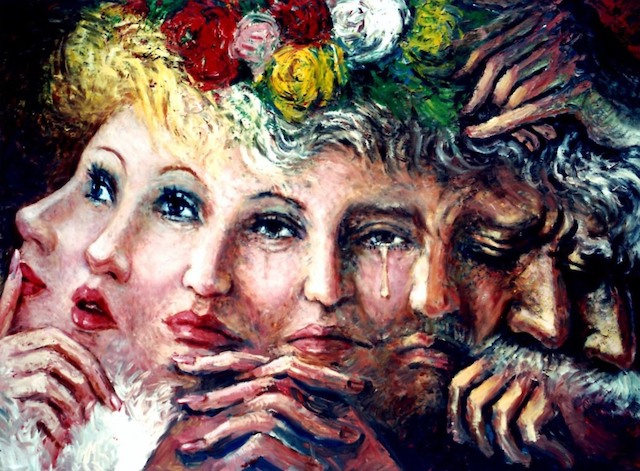I am not a person who has ever believed that people are purely good or purely evil.
Even in fairy tales, I could never accept this simplistic version of events. People are multi-faceted, complicated creatures. We are shaped by our experiences and informed by our environments. With the exception of sociopaths, we are more alike than different and share much of the same emotional range.
It’s late now, and I’ve been lying down with a weight on my chest, unable to sleep. I’ve spent time sorting through my emotions, trying to figure out what exactly was troubling me. I searched for the name of the emotion, and I found that what was keeping me awake was purely disappointment.
You see, I just lost my job—and it happened suddenly. The explanation given didn’t add up. It didn’t match my glowing performance reviews or the raise I’d just received. It didn’t explain the lengthy conversation I’d just had the prior week with my employer about increasing my hours and taking on new projects. Nothing about what was happening made sense, even from a profit and loss perspective.
I spent that day in shock and grief, unable to fully process what had happened. As a single mother of two, who actually loved my job and greeted each work day with a positive attitude and an eagerness for my work, I could not reconcile suddenly being without a job.
The day that it happened, I cycled through extreme grief and anger, and then I began forming a plan for my new life. I obtained a new job in less than 24 hours, reworked my budget and began to look ahead with excitement to the opportunities that just opened up for me.
And yet I am exhausted and cannot sleep, and the emotion I named for my troubles is disappointment.
When we believe that most people are essentially good people at heart, it can be difficult to discover that we are wrong. Because, yes—people are not, as a rule, purely good or purely evil. Life is much too complex for that. But what matters isn’t our motivations or our experiences. What matters isn’t how we feel or what environment has informed our outlook.
At the end of the day, what truly matters is the way in which we treat other people.
Our character, particularly in the way that we are perceived by others, is defined purely on the basis of our actions. So when people I liked and respected act in a way that defies logic, good business sense and, frankly, basic common courtesy, it is difficult to continue to maintain a sense of them being basically good people.
Our actions define us.
So I’m up late, sitting with this heavy feeling of disappointment—not in the loss of the job, but in the loss of my respect and positive feeling.
It left me thinking about how we are defined in this life. Perhaps we are not purely good or purely evil. Perhaps our motivations are complicated, and there’s more to the story than an outsider can ever see. But in the end, our impact will always outweigh our intentions, and our actions matter more than the experiences that informed them. We will be judged not by what we felt, or thought was right, but on what we did and how it impacted others.
We are not islands. Our decisions are not made in a vacuum. And I began to consider my own actions and how they impact others. I began evaluating how my character is perceived and what I can do to make sure that my values are aligned with my actions.
Sometimes I fail.
I recently got tired of a stranger trolling my comments on a friend’s feed, and I told a total stranger to go f*ck themselves. Afterward, I wondered what made me flip the bitch switch so hard on someone I didn’t even know. I do have a temper, but I also exercise quite a bit of control over it. Of course, it could be attributed to resistance fatigue or simply having one too many stressors in my life at the moment. But in the end, all that matters is my action—and it was not an action I’d like to be defined by. Sure, it probably has less of an impact than laying off a single mom of two from her only source of income, but that doesn’t make it any less important.
If we’re going to have opinions and ideals, we need to start examining our actions to make sure they are congruent. In the interest of full disclosure, I have no problem telling someone to f*ck off if their words or actions are harmful to my children or infringe upon someone’s basic human rights. I don’t tolerate a lot of bullsh*t. But by and large, I hope to be known more for my kindness than my temper, which makes me cognizant lately of the way I react, as those reactions will define my character to those who may not have any other basis to define it.
How do we make sure that our actions align with our values? How do we create a life that reflects the character narrative we want repeated? Here are a few ways I’ve found helpful. May it be of benefit!
1. We need to take time to think before reacting. It seems like such a cliché, but counting to 10 never hurts. Angry me probably needs to count to 110. We can wait before we speak, or send that text, or post that status. We can give ourselves time to evaluate the message we want to deliver and decide how best to do so in a way that reflects our values and not the emotions of the moment.
Honestly, I could not be more proud of how I handled the meeting where I lost my job. I stayed calm, and I asked intelligent questions which were met with a lot of excuses that didn’t add up, along with awkward smiles, lack of eye contact and general avoidance. I was able to speak from a place of authenticity without losing control of my temper, and I maintained eye contact throughout the meeting. I felt a calm assurance that while none of this added up, I knew for certain that nothing about my job loss had to do with my job performance, which even they assured me had been above reproach.
2. We need to evaluate our value systems. What are the values that we publicly support? How are those values reflected in our actions and not just in our words? It’s a year of political upheaval and contention, and I have a number of political stances. I make phone calls to my representatives, send letters and donate to the causes I support. If all we ever do is post memes and troll people on social media, we are defined by those actions and not the values we claim to espouse.
3. Are our actions consistent with those values? If we claim to espouse certain values, and yet defend politicians whose actions stand in direct opposition to those values, then our actions are not congruent. Again, it is our actions that will define our character to others. When we identify inconsistencies in our actions and belief systems, we can begin to make new choices to either espouse new values, or start making our actions reflect the values we espouse. I won’t say that it’s a simple choice, but it is an important one.
4. We need to make sure that the actions we take do no harm insomuch as it is possible. When we act in a way that benefits others, our character will be defined by that. When we act out of self-interest or emotional responses that do not factor in those around us, our character will be defined negatively. This isn’t about trying to please others or look good. This is about living a life in which we strive to have a positive impact—or, at the very least, to avoid harming others by acting in a way that doesn’t align with our core values.
Our actions define us.
Sometimes, one wrong action will define us in the minds of others forever. It’s unfortunate, but at the same time, we are tasked to at least consider how we act and react in this world. And when we do make mistakes, we can choose the action of apologizing and righting our wrongs. Choosing not to do so is an action in itself. We are responsible for the choices that we make, and our choices impact the world around us. At the end of the day, we’ll be defined not by the things we said but by the actions we chose.
~
Author: Crystal Jackson
Image: WikiMedia Commons/Public Domain
Editor: Yoli Ramazzina











Read 0 comments and reply